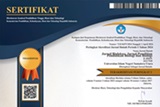Formulation of Jakaba fertilizer from banana peel, pineapple peel, tea dregs for enhanced pak choi (Brassica rapa subsp. Chinensis) growth
Abstract
Keywords
Full Text:
PDFReferences
Abatenh, E., Gizaw, B., Tsegaye, Z., & Wassie, M. (2017). The role of microorganisms inbBioremediation- A review. Environmental Biology, 1(1), 38–46.
Akbari, W. A., Fitrianingsih, Y., & Jati, D. R. (2018). Pemanfaatan limbah kulit pisang dan tanaman Mucuna bracteata sebagai pupuk kompos. Jurnal Teknologi Lingkungan Lahan Basah, 3(1), 1–10.
Ali, S., Asma, S. T., Nadeem, S. F., & Samar, M. (2018). Strategies and kinetics of industrial fermentation for the mass production of various primary and secondary metabolites from microbes. European Journal of Pharmaceutical and Medical Research, 5(6), 595–606.
Ambardini, S., Yanti, N. A., Mamangkey, J., Arsyat, E. Y., & Ardiansyah (2025). Biofungicides derived from indigenous microorganisms fermented on Tagetes erecta L. flowers for the control of anthracnose in chili pepper (Capsicum annuum L.). Plant Science Today, 12 (1), 1–9. https://doi.org/10.14719/pst.4130
Andraskar, J., Yadav, S., & Kapley, A. (2021). Challenges and control strategies of odor emission from composting operation. Applied Biochemistry Adn Biotechnology, 193, 2331–2356.
Arekemase, M. O., Omotosho, I. O., Agbabiaka, O. T., Ajide-Bamigboye, N. T., Lawal, A. K., Ahmed, T., & Oroju, J. O. (2020). Optimization of bacteria pectinolytic enzyme production using banana peel as substrate under submerged fermentation. Science World Journal, 15(1), 56-63.
Aruna, T. E. (2019). Production of value-added product from pineapple peels using solid state fermentation. Innovative Food Science and Emerging Technologies, 57, 102193. https://doi.org/10.1016/j.ifset.2019.102193
Calicioglu, O., Shreve, M. J., Richard, T. L., & Brennan, R. A. (2018). Effect of pH and temperature on microbial community structure and carboxylic acid yield during the acidogenic digestion of duckweed. Biotechnology for Biofuels, 11(275), 1–19. https://doi.org/10.1186/s13068-018-1278-6
Chew, K. W., Chia, S. R., Yen, H. W., Nomanbhay, S., Ho, Y. C., & Show, P. L. (2019). Transformation of biomass waste into sustainable organic fertilizers. Sustainability (Switzerland), 11(8), 1–19. https://doi.org/10.3390/su11082266
Czatzkowska, M., Harnisz, M., Korzeniewska, E., & Koniuszewska, I. (2020). Inhibitors of the methane fermentation process with particular emphasis on the microbiological aspect: A review. Energy Science and Engineering, 8(5), 1880–1897. https://doi.org/10.1002/ese3.609
Fadilah, R. A., Kurnia, M. D., & Putra, I. P. (2024). Jakaba undercover : Taxonomic riddle and potency in Indonesian agriculture. Caraka Tani: Journal of Sustainable Agriculture, 39(2), 411–423. https://doi.org/10.20961/carakatani.v39i2.89049
Fathi, A. (2022). Role of nitrogen (N) in plant growth, photosynthesis pigments, and N use efficiency : A review. Agrisost, 28, 1–8. https://doi.org/10.5281/zenodo.7143588
Guan, N., Li, J., Shin, H. dong, Du, G., Chen, J., & Liu, L. (2017). Microbial response to environmental stresses: from fundamental mechanisms to practical applications. Applied Microbiology and Biotechnology, 101(10), 3991–4008. https://doi.org/10.1007/s00253-017-8264-y
Hardie, D. G. (2018). Keeping the home fires burning: AMP-activated protein kinase. Journal of the Royal Society. Interface, 15(138), 20170774. https://doi.org/10.1098/rsif.2017.0774
Heiborn, D. heidler von, Reinmüller, J., Yurkov, A., Stehle, P., Moeller, R., & Lipski, A. (2023). Fungi under modified atmosphere—The effects of CO2 stress on cell membranes and description of new yeast Stenotrophomyces fumitolerans gen. nov., sp. nov. Journal of Fungi, 9(10). https://doi.org/10.3390/jof9101031
Hikal, W. M., Mahmoud, A. A., Ahl, H. A. H. S.-A., Bratovcic, A., Tkachenko, K. G., Kačániová, M., & Rodriguez, R. M. (2021). Pineapple (Ananas comosus L. Merr.), waste streams, characterisation and valorisation: An overview. Open Journal of Ecology, 11(09), 610–634. https://doi.org/10.4236/oje.2021.119039
Inarejos-García, A. M., Helbig, I., Klette, P., Weber, S., & Maeder, J. (2021). Authentication of commercial powdered tea extracts (Camellia sinensis L.) by gas chromatography. Food Science and Technology, 1(4), 596–604. https://doi.org/10.1021/acsfoodscitech.1c00003
Ismail, H. A., Richard, I., Ramaiya, S. D., Zakaria, M. H., & Lee, S. Y. (2023). Browning in relation to enzymatic activities and phytochemical content in terap peel (Artocarpus odoratissimus Blanco) during postharvest ripening. Horticulturae, 9(57), 1–15. https://doi.org/10.3390/horticulturae9010057
Ismail, M. A., Amin, M. A., Eid, A. M., Hassan, S. E. D., Mahgoub, H. A. M., Lashin, I., Abdelwahab, A. T., Azab, E., Gobouri, A. A., Elkelish, A., & Fouda, A. (2021). Comparative study between exogenously applied plant growth hormones versus metabolites of microbial endophytes as plant growth-promoting for phaseolus vulgaris l. Cells, 10(5), 1–26. https://doi.org/10.3390/cells10051059
Janˇciˇc, U., & Gorgieva, S. (2022). Bromelain and nisin: The natural antimicrobials potential in biomedicine. Pharmaceutics, 14(76), 1–39.
Kholifani, Y. I., Arbiwat, D., & Peniwiratri, L. (2020). The effects of mycorrhizae and organic matters application on soil p availability of limestone post mining and the growth of maize in Karangdawa Village, Tegal Regency. Proceeding International Conference on Green Agro-Industry, 4, 404-413.
Kibria, A. A., Kamrunnessa, Rahman, M. M., & Kar, A. (2019). Extraction and evaluation of phytochemicals from banana peels (Musa sapientum) and banana plants (Musa paradisiaca). Malaysian Journal of Halal Research, 2(1), 22–26. https://doi.org/10.2478/mjhr-2019-0005
Kurniawan, L., Maryudi, M., & Astuti, E. (2024). Utilization of tofu liquid waste as liquid organic fertilizer using the fermentation method with activator effective microorganisms 4 (EM-4): A review. Equilibrium Journal of Chemical Engineering, 8(1), 100–112. https://doi.org/10.20961/equilibrium.v8i1.84056
Li, L., Guo, X., Zhao, T., & Li, T. (2021). Green waste composting with bean dregs, tea residue, and biochar: Effects on organic matter degradation, humification and compost maturity. Environmental Technology and Innovation, 24(35), 101887. https://doi.org/10.1016/j.eti.2021.101887
Liu, L., Wang, S., Guo, X., Zhao, T., & Zhang, B. (2018). Succession and diversity of microorganisms and their association with physicochemical properties during green waste thermophilic composting. Waste Management, 73, 101–112. https://doi.org/10.1016/j.wasman.2017.12.026
Lu, Z., & Imlay, J. A. (2021). When anaerobes encounter oxygen: Mechanisms of oxygen toxicity, tolerance and defence. Nature Reviews Microbiology, 19(12), 774–785. https://doi.org/10.1038/s41579-021-00583-y
Maryana, Haryanto, D., & Lifia, R. C. (2023). Role of tea dregs liquid organic fertilizer and plant media composition in increasing tomato results (Lycopersicon esculentum Mill.). Journal Techno, 9(1), 1–10.
Minarni, M., & Riga, R. (2024). Phytochemical potentials and antibacterial activity of pineapple peel extract (Ananas Comosus L Merr) against Streptococcus mutans. Migration Letters, 7(57), 1833–1838.
Nadeem, F., Hanif, M. A., Majeed, M. I., & Mushtaq, Z. (2018). Role of macronutrients and micronutrients in the growth and development of plants and prevention of deleterious plant diseases - A comprehensive review. International Journal of Chemical and Biochemical Sciences, 13, 31–52.
Nanda, R. F., Rini, B., Syukrti, D., Thu, N. N. A., & Kasim, A. (2020). A review: Application of bromelain enzymes in animal food products. And. Int. J. Agric. Nat. Sci, 1(1), 33–44.
Ndese, T. V. P., Kamagi, D. D. W., Lawalata, H. J., Mokosuli, Y. S., & Taulu, M. L. S. (2024). The effect of biofertilizer (Jakaba) fertilizer on vegettive growth of chili plants (Capsicum annum L.). Advances in Tropical Biodiversity and Environmental Sciences, 8(1), 119–124. https://doi.org/10.24843/ATBES.2024.v08.i03.p01
Nitami, A. P. J., & Asngad, A. (2023). Quality of kirinyuh leaf liquid organic fertilizer and coconut water waste with pineapple skin bioactivator. International Conference on Biology Education, Natural Science, and Technology, 1(1), 122–132.
Orhan, T. Y., & Sahin, N. (2018). The impact of innovative teaching approaches on biotechnology knowledge and laboratory experiences of science teachers. Education Sciences, 8(4), 1-24. https://doi.org/10.3390/educsci8040213
Panpatte, D. G., Jhala, Y. K., Shelat, H. N., & Vyas, R. V. (2016). Pseudomonas fluorescens: A promising biocontrol agent and PGPR for sustainable agriculture. Microbial Inoculants in Sustainable Agriculture Productivity, 1, 257–270. https://doi.org/10.1007/978-81-322-2647-5
Pujiati, & Asngad, A. (2024). Efektivitas pupuk organik cair jerami padi dan ampas teh terhadap pertumbuhan dan kandungan kalsium tanaman selada (Lactuca sativa L.). Jurnal Pendidikan Biologi Dan Sains, 7(1), 284–293. https://doi.org/10.58351/2949-2041.2024.8.3.013
Rahman, K. M. A., & Zhang, D. (2018). Effects of fertilizer broadcasting on the excessive use of inorganic fertilizers and environmental sustainability. Sustainability (Switzerland), 10(3), 1–15. https://doi.org/10.3390/su10030759
Ranadheera, C. S., Mcconchie, R., Phan-thien, K., & Bell, T. (2017). Strategies for eliminating chicken manure odour in horticultural applications. Wordl’s Poultry Science Journal, 73(2), 365–378. https://doi.org/10.1017/S0043933917000083
Rashmi, I., Roy, T., Kartika, K. S., Pal, R., Coumar, V., Kala, S., & Shinoji, K. C. (2020). Organic and inorganic fertilizer contaminants in agriculture: Impact on soil and water resources. Contaminants in Agriculture: Sources, Impacts and Management, 3–41. https://doi.org/10.1007/978-3-030-41552-5
Risman, A. (2022). Pertumbuhan dan produksi tanaman cabai katokkon (Capsicum chinense Jacq) pada berbagai konsentrasi pupuk jakaba. [Skripsi]. Universitas Bosowa.
Rofi’i, M., Susanti, A., & Zuhria, S. A. (2021). The formulation’s technique using microbes to the speed decomposition of biomass fertilizers. AGARICUS: Advances Agriculture Science & Farming, 1(1), 28–36.
Salim, R., Nehvi, I. B., Mir, R. A., Tyagi, A., Ali, S., & Bhat, O. M. (2023). A review on anti-nutritional factors: Unraveling the natural gateways to human health. Frontuers in Nutrition, 10(1215873). https://doi.org/10.3389/fnut.2023.1215873
Samanta, S. (2020). Potential bioactive components and health promotional benefits of tea (Camellia sinensis). Journal of the American College of Nutrition, 41(1), 1–29. https://doi.org/10.1080/07315724.2020.1827082
Sari, R., Maryam, & Yumah, R. A. (2023). Penentuan C-Organik pada tanah untuk meningkatkan produktivitas tanaman dan keberlanjutan umur tanaman dengan metoda spektrofotometri UV VIS. Jurnal Teknologi Pertanian, 12(1), 11–19.
Sekaringsih, N. J., & Asngad, A. (2023). LOF kirinyuh leaves and liquid waste tempeh with pineapple peel bioactivator : Sensory and macronutrient content. International Conference on Biology Education, Natural Science, and Technology, 1(1), 335–347.
Sutikarini, S., Masulili, A., Suryani, R., Setiawan, S., & Mulyadi, M. (2023). Characteristics of pineapple waste as liquid organic fertilizer and its effect on ultisol soil fertility. International Journal of Multi Discipline Science, 6(1), 38. https://doi.org/10.26737/ij-mds.v6i1.3754.
Virginia, R., Wahyunigtyas, R.S., Silalahi, M., & Mamangkey, J. (2023). Pengaruh Limbah Organik Terhadap Pertumbuhan Kangkung Darat (Ipomoea reptans Poir) Dan Pemanfaatannya Sebagai Bahan Ajar. ORYZA Journal of Biology Education, 12 (2), 252-260. https://doi.org/10.33627/oz.v2i2.1337
Wang, J., Chen, Y., Wang, P., Li, Y. S., Wang, G., Liu, P., & Khan, A. (2018). Leaf gas exchange, phosphorus uptake, growth and yield responses of cotton cultivars to different phosphorus rates. Photosynthetica, 56(X), 1–8.
Yu, H., Xie, B., Khan, R., & Shen, G. (2019). The changes in carbon, nitrogen components and humic substances during organic-inorganic aerobic co-composting. Bioresource Technology, 271, 228–235. https://doi.org/10.1016/j.biortech.2018.09.088
Yu, T., & Chen, Y. (2019). Effects of elevated carbon dioxide on environmental microbes and its mechanisms: A review. Science of the Total Environment, 655, 865–879. https://doi.org/10.1016/j.scitotenv.2018.11.301
Yuan, H., & Zhu, N. (2016). Progress in inhibition mechanisms and process control of intermediates and by-products in sewage sludge anaerobic digestion. Renewable and Sustainable Energy Reviews, 58, 429–438. https://doi.org/10.1016/j.rser.2015.12.261
Yusminan, Walida, H., Harahap, F. S., & Mustamu, N. E. (2022). Comparison of Jakaba growth with the addition of organic matter in rice washing water. International Journal of Science and Environment (IJSE), 2(2), 74–78. https://doi.org/10.51601/ijse.v2i2.16
Zhu, J., Wang, J., Yuan, H., Ouyang, W., Li, J., Hua, J., & Jiang, Y. (2022). Effects of fermentation temperature and time on the color attributes and tea pigments of Yunnan Congou black tea. Foods, 11(1845), 1–15. https://doi.org/10.3390/foods11131845
Zou, F., Tan, C., Zhang, B., Wu, W., & Shang, N. (2022). The valorization of banana by-products: Nutritional compositon, bioactivities, applications, and future development. Foods, 11(20), 1–25. https://doi.org/10.3390/foods11203170
DOI: http://dx.doi.org/10.30821/biolokus.v8i1.4470
Refbacks
- There are currently no refbacks.
Copyright (c) 2025 Jurnal Biolokus : Jurnal Penelitian Pendidikan Biologi dan Biologi
indexed by :












